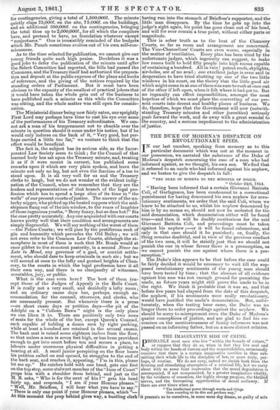THE DUKE OF MODENA'S DESPATCH ON REVOLUTIONARY SPIES.
IN our last number, speaking from memory as to this particular document which was not at the moment in our possession, we narrated the substance of the Duke of Modena's despatch concerning the case of a man who had informed against, as we thought, his own son. We find that it referred to an uncle who had informed against his nephew, and we hasten to give the despatch in full:
"THE DUKE OP MODENA. TO THE MINISTER OP POLICE.
"October 24th, 1854.
"Having been informed that a certain Giovanni Battista Coli, of Garfagnana, has been condemned to a correctional punishment for having denounced his own nephew for revo- lutionary sentiments, we order that the said Coli, whom we know to be attached to us, whilst his nephew denounced by him is by no means so, should not now be molested for the said denunciation, which denunciation either will be found true—and then it will be doubly meritorious for the said Giovanni Battista Coli, and proceedings must be taken against his nephew ;—or it will be found calumnious, and only in that case should it be punished ; or, finally, the thing remains doubtful, and in view of the previous conduct of the two men, it will be strictly just that we should not punish the one in whose favour there is a presumption, as we cannot punish the one against whom there is a pre- sumption."
The Duke's idea appears to be that before the case could be fairly decided it would be necessary to wait till the sup- posed revolutionary sentiments of the young man should have been tested by time ; that the absence of all evidence against him now was not enough ground for punishing the uncle, as future years might still prove the uncle to be in the right. We think it probable that it was so, and that before five years had elapsed from the date of this despatch, the nephew, if his sentiments were really revolutionary, would have justified the uncle's denunciation. But, unfor- tunately, when the testing hour came' the Duke was no longer there to order proceedings against the nephew. We should be sorry to misrepresent even the Duke of Modena's quaint conceptions of justice, and are glad to find his en- comium on the meritoriousness or family informers was not passed on an informing father, but on a more distant relative.






























 Previous page
Previous page